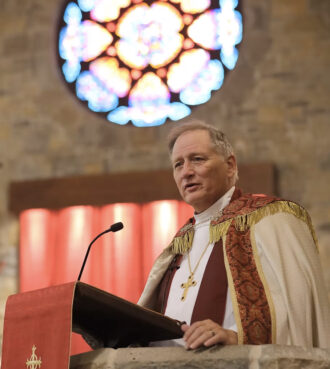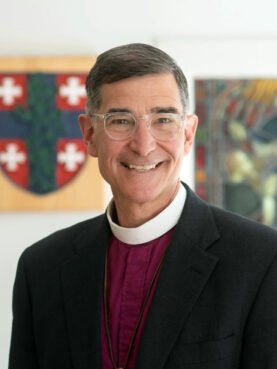(RNS) — When churches split from the Episcopal Church and the Anglican Church of Canada in 2009 to form the Anglican Church of North America, the denomination’s church leaders hoped for a fresh start. Though they had broken with their mainline Protestant church bodies because of their conservative views on LGBTQ+ clergy, same-sex marriage and women’s ordination, ACNA also aspired to be a more nimble, less hierarchical church, free of the infighting that came with too much oversight.
But in recent years ACNA has suffered repeated clashes over clergy misconduct protocols, bishop accountability and women’s ordination. On Monday (Sept. 22), another crisis broke out, as the Jurisdiction of the Armed Forces and Chaplaincy moved to exit the denomination and attempted to take its chaplains with it. The JAFC, a nonprofit organization, is the body that officially “endorses” ACNA chaplains, providing them a necessary credential to serve military personnel and in other settings.
On Sunday, Archbishop Steve Wood, who heads ACNA, temporarily restricted Bishop Derek Jones, who oversees the JAFC, from ministry, citing “credible complaints” alleging “abuse of ecclesiastical power.” But by the time he announced the restrictions, the JAFC had already announced its departure from ACNA.
Leaders at JAFC and in the ACNA differ on what led to the clash and on where it has left those involved. Jones told Religion News Service that since he had already withdrawn from ACNA by signing a letter to that effect on Sept. 20, he is no longer under its jurisdiction. ACNA leaders claim that even if Jones and JAFC leaders leave, ACNA retains the power to endorse its chaplains and the 300-odd chaplains affiliated with JAFC.
JAFC leaders responded in a cease-and-desist letter directing Wood and other ACNA leaders to stop claiming “any ecclesiastical or practical right of supervision over the Jurisdiction or its chaplaincy program.”
Thursday evening, the ACNA announced that its endorsing body will be led by newly elected Bishop Jerome R. Cayangyang, who serves as deputy chaplain of the Marine Corps for Reserve Matters. “Bishop Cayangyang will provide leadership, pastoral care, and oversight for Anglican clergy serving as chaplains in the United States Armed Forces, federal and state agencies, hospitals, and other specialized institutions,” the announcement said.

Anglican Church in North America logo. (Courtesy of ACNA)
“It’s an evolving situation, and there’s ongoing conversations with all those involved,” said David Wake, executive director for the Armed Forces Chaplains Board at the Department of War, on Friday. “And, chaplains should not be concerned about their certifications to serve.”
Jones faces several allegations, including that he misused ACNA’s clergy misconduct protocols and fabricated or back-dated official church documents. Six people have said Jones inflicted psychological and emotional stress on people under his care.
Jones spoke to these allegations in a video call with JAFC chaplains Monday evening. During that call, which has now been made public, Jones denied fabricating or backdating documents and said the confusion over document changes was because they were edited by multiple people.
“We have counselors. We have psychologists. We have deans and deaneries to help with emotional and psychological things,” said Jones in the video call about the stress allegations. “And when they come to me and you’re seeking help from me, if I’m not providing good emotional and psychological help for you and I’m only stressing you, you don’t have to talk to me.”

Bishop Derek Jones. (Photo © Anglican Chaplains)
He later told RNS that the six people’s claims were nebulous and unfounded and charged that at least one was a product of society’s “woke” mentality.
The Rev. William Barto, an attorney and priest in the Reformed Episcopal Church, a subjurisdiction of ACNA, said that the misconduct allegations are substantial. “It amounts to abuse of clerical authority, extortion and, if we were in a civil arena, intentional infliction of emotional distress,” he said. “These are not things that the archbishop should ignore.”
Jones believes he has been targeted by ACNA leaders in part because he has been a vocal critic of the archbishop’s leadership and because of his attempts to gain greater autonomy and formal status for JAFC. The bylaws currently treat the Special Jurisdiction of the Armed Forces as an entity without the independence of a diocese. In protest, Jones said, they recently withheld direct financial support to ACNA.
A spokesperson for ACNA told RNS that there’s “no documented agreement or understanding” that any of JAFC’s decisions involving tithes to the denomination related to bylaw concerns.
Jones said that, despite these disputes, he was willing to participate when Wood told him on Sept. 12 that a third-party investigator would be looking into the allegations. That changed, Jones said, when church lawyers informed him that the archbishop wasn’t authorized to order an investigation, especially at that juncture. Instead, formal charges must first be brought against Jones and referred to a Board of Inquiry, a 10-person body responsible for overseeing any investigation.
ACNA leaders defended the proposed investigation, saying, “It is customary for the province to complete an initial investigation into credible claims to determine if any rise to the level of a presentable offense,” a spokesperson told RNS via email. (ACNA, though an independent denomination, calls itself a province of a group of dissenting churches.)
Believing the proposed investigation to be unlawful, however, JAFC’s church lawyers and executive committee reportedly instructed Jones and anyone affiliated with the JAFC not to cooperate. According to a statement from the JAFC, the nonprofit is currently “in discussions with several provinces in the global Anglican Communion to provide continued connection between the JAFC and the Communion.”
Jones believes these events are part of a broader theological clash between Anglican complementarians — who typically restrict leadership roles to men — and egalitarians, who are more in favor of women in church leadership. ACNA does not allow women to be made bishops but allows its regional bodies to determine whether to ordain women priests and deacons.
Jones, a complementarian, alleges that Wood has been slow to bridge differences. “(Archbishop) Steve promised that he was going to navigate those waters well, but in fact, has hired nothing but egalitarian staff, in training bishops, has nothing but egalitarian bishops. He’s trying to push an agenda,” said Jones.
But Barto said the clash is more about ACNA’s need for more clear, comprehensive and transparent bylaws.
“I think that what this crisis illustrates is the limits of authority on the part of the Province, the Anglican Church in North America, and particularly the Archbishop and the challenge of holding bishops accountable for misconduct,” he said. “This underscores the need for canonical reform in ACNA.”



